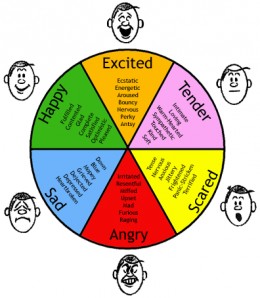The young girl stomped up my stairs red-faced, eyes shining with unshed tears, her usually tidy light hair disheveled, one pigtail-holder dangling dangerously close to losing hold. She slammed her book-bag on the floor, pulled at her coat sleeves and sat huffy by the table, arms crossed.
“What’s going on?” I asked.
“Nothing.”
Well … I was far from convinced … It seemed more like anything but.
“Sure looks like something is going on …” I offered, “you look upset, and you usually don’t just throw your bag on the floor and sit down … ”
“Sorry,” she mumbled and reached over to right the bag, not seeming particularly enamored with me, either.
“Oh, I don’t care about the bag,” I stated, realizing I could have certainly worded myself better. “I was just saying how you looked upset. I know that when I feel like tossing a bag onto the floor like that it is usually because I’m feeling upset.”
“Yeah.”
I waited.
“So I’m upset, okay?!”
The I said what you wanted me to say, so are you happy now? tone was evident, and it made me smile.
Wrong move. The girl’s forehead darkened. “What? So it’s funny?”
“No! Not at all!” I back-paddled, volume of smile lowered considerably. “I was smiling with affection. You don’t have to talk about any of this if you don’t want to. I’m just sorry that you are having a rough day.”
Silence. The child backed into the chair, progressively slumping as if all the air leaked slowly out of her. I waited. When she said nothing, I placed my hand on the table close to her, offering support. She looked up at me, unhooked one arm and played absentmindedly with my bracelet, then took my hand, and looked up again. Her green-gray eyes were brimming now and I could see that there were two trails of dried tears already on her cheeks, prepared to shuttle the incoming ones.
“I hate it when everyone tells me what to be!” She blurted, voice choked.
“Yeah,” I said softly.
“I am upset!” She stated. “A lot! All kinds of upset. Remember how we worked on feeling words and synonyms and opposites and all that stupid nonsense?”
I smiled. I did remember. Of course I did not think that any of it was even close to nonsense (especially not ‘stupid nonsense’ …), but I didn’t think being persnickety would help and so I kept my mouth shut about that.
“Well,” she half-smiled, realizing. “Sorry … not stupid nonsense, but sort of. It was really boring … but, anyway … I’m also feeling really annoyed and irritated. Disgusted, too. All part of upset, isn’t it?”
“Aha,” I confirmed, figuring that as she was doing a really good job herself, the best I could do was keep myself from interfering or thinking I knew what she wanted me to say.
“So I am. Upset. Angry. Frustrated. Whatever. Why do adults get to make decisions about my life? It is my life, not theirs!” She looked up at me, her pretty face now more sad and disappointed than angry. Putting feelings into words often does that … Verbalizing helps emotions clarify and flow.
“I’m sorry,” I said. I did feel sorry. I hate seeing children upset, and I know how helpless kids can feel sometimes–some of them absolutely all too often and this particular child more often than I’d like her to. I also felt proud of her. For a girl who not too long ago had very few words with which to describe anything, let alone her own feelings, this was seriously wonderful progress.
“My mom says I can’t go to sleep-away camp,” she finally spat out, letting go of my hand in dejection and curling back into herself. “She says that ‘I need the summer for catching up with schoolwork’ … What about what I need? What about if I need a break?” The tears cascaded now, the unfairness of it all flooding her.
I sighed. This was going to be the girl’s first time at sleep-away, and she was looking forward to the four-week-adventure for just about forever. Her cousin and a good friend were also planned to go to the same “sports and fun camp”, as she called it, and it had been my impression that the parents were naturally wary to have their little girl away for the first time, but still supportive. Whatever brought this on, I did not think that canceling the camp was a good solution, and certainly not for supposed academics.
She looked up at me, suddenly suspicious. “Did you tell her that I need to stay home to do school work all summer?”
I certainly did not, but even before I could say anything, she took a breath and shook her head, “I know you wouldn’t, though. You always say playing is important, too. You don’t even like homework for kids with long schooldays. I heard you tell my mom that, on the phone …” she looked up mischievously, imparting a secret. “Don’t tell her … she doesn’t know … but I listened on the other line …”
I chuckled. Eavesdropping is not the most polite thing, even if I couldn’t say I blamed her for being curious to know what was being discussed when the topic was herself. Talking about boundaries and appropriate behavior could wait, however.
“You’re right,” I said. “I do think playing is important. As important as learning. Sometimes even more important. I’m not sure why your mother said what she did, but if you’d like me to, I would speak to her about the summer camp. In fact, I want to know from her what this is all about.”
Hope dawned behind the tears. “You’d tell her I should go?”
This got another chuckle. Smart cookie, this one. “Well … I certainly think it is a good idea to have a break, and personally I would like to see you going, but parents have all kinds of considerations … I would like to speak to your mother about this but I don’t know that I will tell her that you ‘should’ go.”
“Okay …” she deflated some. “I wish you would tell her, though. She’d have to send me there if you say so.” Sigh. Shrug. The child finally unzipped and emerged from her coat (I was wondering how long she was going to let herself be cooked, with the heat on in the room besides). She hung the coat on the back of her chair and moved an arm–slightly defiantly, I thought–over her eyes and cheeks. Why bother with a tissue when there is a sleeve nearby … and when she can thereby show her discontent for my not promising to order her mother around some …
I smiled, and she smiled back, blushing slightly. Kids know when we see through them (though we are sometimes far less perceptive when they see right through us!).
We went on with our session, but before she got picked up by her babysitter the girl stopped me mid-sentence as I was discussing a task we were completing. “You won’t forget to talk to my mom, right?”
“I won’t,” I promised.
“I mean, don’t forget to tell her I was really annoyed and angry and frustrated and all kinds of upset about it!”
You bet’cha, little one. And so well done … No way I would forget, and me all kinds of proud of you for that …









You must be logged in to post a comment.